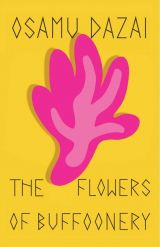|
Vážení zákazníci,
do 9. 2. probíhá inventura našeho skladu. Objednávky vytvořené v tomto období budou expedovány až po jejím ukončení.
Děkujeme za pochopení. |
The Flowers of Buffoonery

|
vyprodáno |
|
Internetová cena:
|
295,00 Kč 
|
|
Běžná cena:
|
369,00 Kč |
|
Zboží není skladem
|
| Autor: |
Osamu Dazai
|
| Jazyk: |
anglicky |
| Vazba: |
měkká |
| Počet stran: |
64 |
| Formát: |
13,2 x 20,6 cm |
| ISBN/EAN: |
9780811234542 |
| Překladatel: |
Sam Bett |
| Nakladatel: |
New Directions |
| Rok vydání: |
2023 |
| Edice: |
Současná beletrie
/ Beletrie
|
For the first time in English, the hilarious and deeply moving prequel to No Longer Human The Flowers of Buffoonery opens in a seaside sanitarium where Yozo Oba―the narrator of No Longer Human at a younger age―is being kept after a failed suicide attempt. While he is convalescing, his friends and family visit him, and other patients and nurses drift in and out of his room. Against this dispiriting backdrop, everyone tries to maintain a lighthearted, even clownish atmosphere: playing cards, smoking cigarettes, vying for attention, cracking jokes and trying to make each other laugh. While No Longer Human delves into the darkest corners of human consciousness, The Flowers of Buffoonery pokes fun at these same emotions: the follies and hardships of youth, of love and of self-hatred and depression. A glimpse into the lives of a group of outsiders in prewar Japan, The Flowers of Buffoonery is a darkly humourous and fresh addition to Osamu Dazai’s masterful and intoxicating oeuvre. Review Dazai was an aristocratic tramp, a self-described delinquent, yet he wrote with the forbearance of a fasting scribe. --Patti Smith
What I despise about Dazai is that he exposes precisely those things in myself that I most want to hide. --Yukio Mishima About the Author OSAMU DAZAI was born in 1909 into a powerful landowning family of northern Japan. A brilliant student, he entered the French department of Tokyo University in 1930, but later boasted that in the five years before he left without a degree, he had never attended a lecture. Dazai was famous for confronting head-on the social and moral crises of postwar Japan before he committed suicide by throwing himself into Tokyo’s Tamagawa Aqueduct. His body was found on what would have been his 39th birthday.
SAM BETT is a fiction writer and Japanese translator. His translation of Star by Yukio Mishima won the 2019-2020 Japan-U.S. Friendship Commission Prize for the Translation of Japanese Literature. Heaven by Mieko Kawakami, which he translated with David Boyd, was shortlisted for the 2021 International Booker Prize.
Další knihy od tohoto autora
Diskuze
Žádný příspěvek do diskuze. Přidejte svůj názor »
|
















